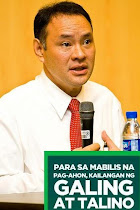 Today, many of our educational problems are based on the lack of technology and human intensive capital, given the lack of classrooms, lack of teachers in public schools and insufficiency of books and other material resources needed to conduct a class session.
Today, many of our educational problems are based on the lack of technology and human intensive capital, given the lack of classrooms, lack of teachers in public schools and insufficiency of books and other material resources needed to conduct a class session.The National Government, in its effort to continuously and adequately comply with the increasing demand of the population, has responded with efforts to intensify the logistical needs of our education, through establishment of new schools and additional buildings within schools.
We produce elementary, high school and college graduates through the Public Education System, and indeed a lot of students have benefited from it. However, much it has addressed the process of servicing the purpose of providing education to the masses, it does not serve its purpose of producing quality laborers, workers and individuals to absorb the vicious realities outside of the four walls of the classroom.
The motherhood and fundamental principle which everything education stands for becomes secondary to compliance of the State to provide education to the masses, where the primary should have been to create a system that enables students to be fully geared to be the prime movers of our economy.
This falls on the lack of versatility and the traditional view that we have towards education, that if we provide books, classrooms, volume of teachers and an instruction manual, everything as a result would be quality education.
American culture has had a major influence on many of our processes today, which includes our structure of government, customs and traditions, and the idea of democracy. Our system of education is also predicated to the American education system created by Horace Mann, considered to be "The Father of American Public Education", popularly known as the Prussian Educational System.
This was a system which traces it roots to the time of Napoleon, as the Prussians devised a system that would teach “duty, discipline, respect for authority, and the ability to follow orders," in reaction to the fall of his rule.
The Prussian system instituted compulsory attendance, national training for teachers, national testing for all students (used to classify children for potential job training), national curriculum set for each grade, and mandatory kindergarten. The purpose of the system was to instill loyalty to the crown; and train young men for the military and bureaucracy.
However, there were inflicted motives by the State to decrease the right of the people then to self-determination. The Prussian system wasn’t designed for the good of the individual but for the good of the government. In accordance to this implicit motive, it advocates that "The schools must fashion the person, and fashion him in such a way, that he simply cannot will otherwise than what you wish him to will." It also had a view that "Education should aim at destroying free will so that after pupils are thus schooled they will be incapable throughout the rest of their lives of thinking or acting otherwise than as their school masters would have wished. "
The system was intended to satisfy the state's desires for the people, and does not support a democratic process of free will and a right of self-determination amongst the participants of the process.
Unfortunately, this system does not support our advances towards a growing democracy. In this system, the teacher acts as the sole provider of sufficient knowledge, and the student, in his aim at satisfying the demands of the system, recognizes the fact that it must act in accordance to the medium of instruction.
There are some instructors who have drifted away from this system, but there is a need for the National Government to institutionalize the system and the medium of instruction for our children. Our curriculum has not become responsive to the changes and the dynamism of today's modern society, and does not align itself with the system set forth by other developed nations. It does not take into account an increased technical discourse and interactive learning which would help the individual further his knowledge, given his ability to re-invent and innovate the fundamentals which seem to have become non-responsive to the modern world.
We must institutionalize a system that will allow our students access to the fundamental laws of each field of study, and must give him the ability to discern later on what is right and what is wrong. It is still important that the fundamentals be established so that he will have a clear reference on how to further the good side and change the bad side. We must make our classrooms an atmosphere of interactive learning, and our measurement of knowledge and readiness to take the next level should not be based on hallow assessment and achievement tests, but should be based on the capacity of a student to expound and assess the positive and negative arguments for and against the concept/theory, and that can be achieved through a culture of research that must be promoted at the higher levels.
This stand of Gibo Teodoro recognizes the importance of technology and human intensive capital expansion in today's educational system. However, above all considerations, the curriculum and the medium of instruction is the bible and the fundamental law the supersedes all logistical needs, all infrastructure needs and demands.
The state must align its efforts towards a growing democracy by drifting away and shifting away from the Prussian system of Education, which instills an authoritarian rule, to a system that allows a free exchange of thoughts through strong fundamental knowledge and an even better appreciation of the medium- through advancing critical thinking, to inspire innovation and new thoughts, since the educational system should foster an environment which serves as a marketplace of ideas. By virtue of this mechanism, we promote a system that is capable of making our students more equipped to answer the challenges of the corporate and business world.






0 comments:
Post a Comment